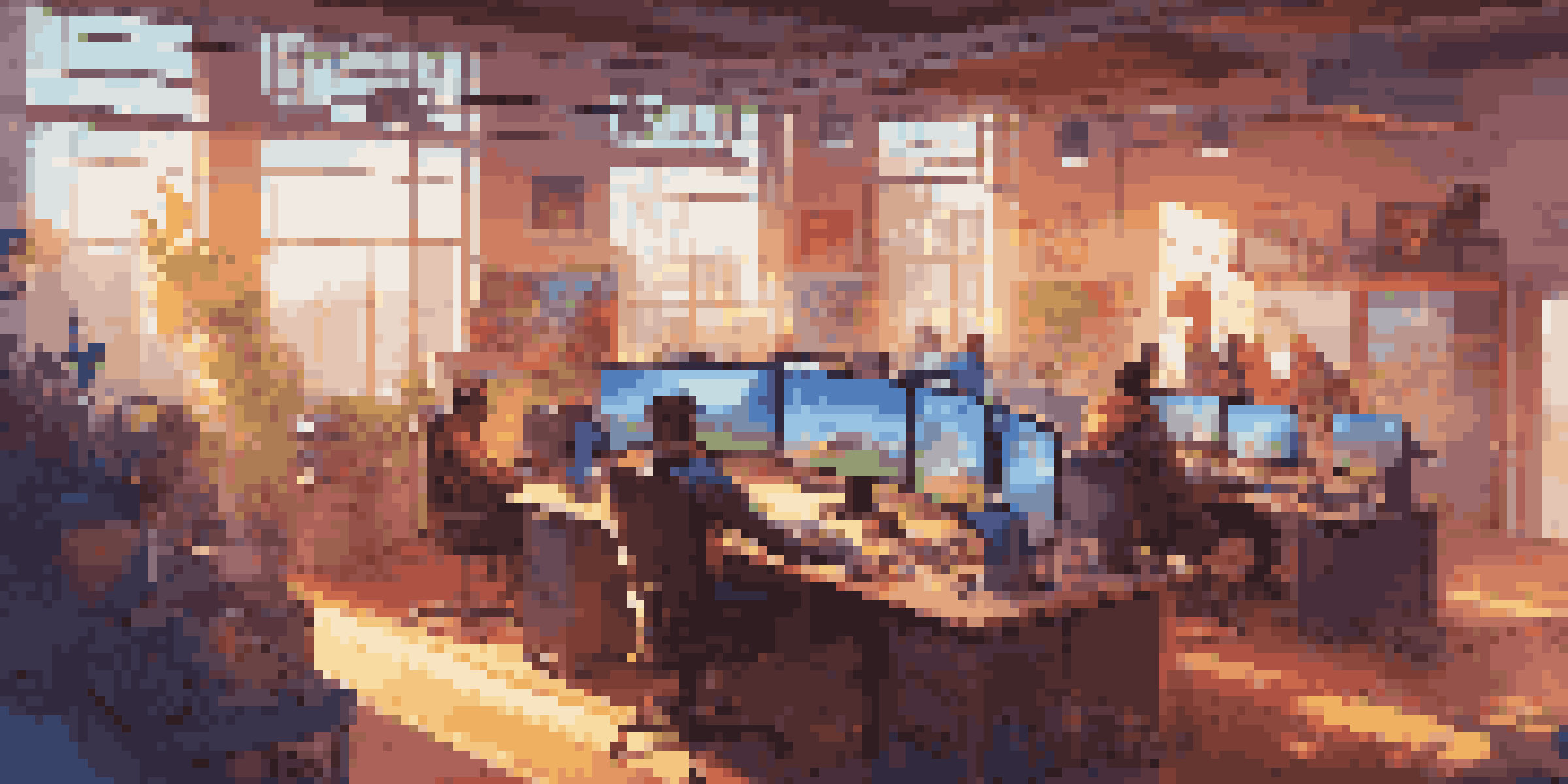The Role of Community Feedback in Game Development

Understanding Community Feedback in Gaming
Community feedback refers to the opinions, suggestions, and critiques that players share about a game. This feedback can come from various channels, such as forums, social media, and direct surveys. In the world of game development, it plays a crucial role in shaping the final product, ensuring it resonates with the target audience.
Feedback is the breakfast of champions.
When developers listen to their community, they gain insight into what players enjoy, what frustrates them, and what features they wish existed. This information is invaluable, as it allows developers to align their vision with players' expectations. It's like having a GPS that guides you through the often complex landscape of game design.
Moreover, engaging with the community fosters a sense of belonging and loyalty among players. When they see their feedback being acknowledged and implemented, it builds trust and strengthens the relationship between developers and gamers.
The Feedback Loop: Iteration and Improvement
Game development is an iterative process, meaning it often requires multiple rounds of testing and refining. Community feedback acts as a catalyst in this loop, prompting developers to make necessary changes and enhancements. For example, if players find a particular level too challenging, developers can adjust the difficulty based on that input.

This continuous cycle of feedback and improvement leads to a more polished product upon release. Developers can experiment with gameplay mechanics and storylines, using player reactions to guide their decisions. Think of it as a chef tasting their dish repeatedly until it reaches perfection.
Community Feedback Shapes Games
Developers gain valuable insights from player feedback, allowing them to align their designs with player expectations.
Ultimately, this iterative approach not only improves the game but also keeps players engaged throughout the development process. Gamers feel like they are part of a collaborative journey, which can lead to a more successful launch and a dedicated player base.
Building a Community: The Power of Engagement
Creating a strong community around a game is essential for gathering meaningful feedback. Developers can engage with players through platforms like Discord, Reddit, or Twitch, creating spaces where players feel comfortable sharing their thoughts. This engagement is akin to hosting a town hall meeting where everyone is invited to voice their opinions.
The customer’s perception is your reality.
Regular interaction with the community also allows developers to clarify misunderstandings and provide updates on game progress. By keeping lines of communication open, developers can cultivate loyalty and enthusiasm among players. It's not just about collecting feedback; it's about building relationships that last.
Furthermore, a vibrant community can generate organic buzz around a game, leading to increased visibility and interest. When players feel invested in a game’s development, they're more likely to share their excitement with others, amplifying the reach of the developers’ efforts.
Identifying Trends and Preferences Through Feedback
Community feedback is an excellent tool for identifying trends and player preferences. By analyzing the data collected from various sources, developers can discern which features are widely liked and which ones need improvement. For instance, if most players rave about the graphics but dislike the storyline, developers can prioritize adjusting the narrative.
This trend analysis allows developers to make informed decisions that align with player interests. It’s much like a fashion designer who studies runway trends to create a collection that resonates with customers. By staying attuned to what players want, developers can create games that are not only enjoyable but also commercially viable.
Engagement Builds Player Loyalty
Regular interaction with the gaming community fosters trust and loyalty, essential for a successful game launch.
Moreover, being responsive to trends can help developers stay ahead of the competition. In the fast-paced gaming industry, knowing what players are leaning toward can provide a significant advantage in creating standout experiences.
The Risks of Ignoring Community Feedback
Ignoring community feedback can lead to significant pitfalls in game development. When developers dismiss player opinions, they risk alienating their audience, which can result in negative reviews and poor sales. It’s similar to a restaurant ignoring customer complaints about a dish—the customers may choose not to return.
Additionally, lack of engagement can foster frustration and resentment within the community. Players might feel undervalued, leading to a decline in enthusiasm for the game. This disengagement can be detrimental, especially if the game relies on a dedicated player base for ongoing support.
Ultimately, failing to listen to feedback can hinder a game's success and longevity. Developers should strive to create an environment where players feel heard and valued, as this can be crucial for maintaining a thriving gaming community.
Case Studies: Successful Games Powered by Feedback
Numerous games have thrived by actively incorporating community feedback into their development processes. For instance, the game 'No Man's Sky' initially faced backlash for not meeting player expectations. However, the developers took this feedback to heart and worked diligently to enhance the game, leading to a remarkable turnaround in its reception.
Similarly, 'Fortnite' regularly updates its gameplay based on player input. By listening to their community, they have introduced new modes, features, and events that keep the game fresh and exciting. This adaptability is a key reason behind their massive success and player retention.
Ignoring Feedback Risks Failure
Dismissal of community opinions can alienate players and jeopardize the game's success and longevity.
These examples illustrate the power of community feedback in shaping games that resonate with players. When developers treat feedback as a valuable asset rather than a nuisance, they open the door to innovation and improvement.
The Future of Game Development and Community Interaction
As the gaming industry continues to evolve, the role of community feedback will likely become even more integral to game development. With advancements in technology, developers can gather player input more efficiently through various digital channels. This accessibility opens the door for more dynamic and real-time feedback loops.
Additionally, as games become more complex, the need for diverse player perspectives will grow. Developers can leverage community insights to create more inclusive and representative gaming experiences. This could mean tailoring content to different player demographics or exploring innovative gameplay mechanics.

Looking ahead, the relationship between developers and the gaming community will be crucial in shaping the future of gaming. By valuing and incorporating community feedback, developers can create games that not only entertain but also foster a sense of shared ownership and collaboration.